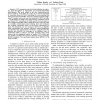Free Online Productivity Tools
i2Speak
i2Symbol
i2OCR
iTex2Img
iWeb2Print
iWeb2Shot
i2Type
iPdf2Split
iPdf2Merge
i2Bopomofo
i2Arabic
i2Style
i2Image
i2PDF
iLatex2Rtf
Sci2ools
127
click to vote
INFOCOM
2009
IEEE
2009
IEEE
RAPID: Shrinking the Congestion-Control Timescale
Abstract—TCP congestion-control is fairly inefficient in achieving high throughput in high-speed and dynamic-bandwidth environments. The main culprit is the slow bandwidth-search process used by TCP, which may take up to several thousands of round-trip times (RTTs) in searching for and acquiring the end-to-end spare bandwidth. Even the recently-proposed “highspeed” transport protocols may take hundreds of RTTs for this. In this paper, we design a new approach for congestion-control that allows TCP connections to boldly search for, and adapt to, the available bandwidth within a single RTT. Our approach relies on carefully orchestrated packet sending times and estimates the available bandwidth based on the delays experienced by these. We instantiate our new protocol, referred to as RAPID, using mechanisms that promote efficiency, queue-friendliness, and fairness. Our experimental evaluations on gigabit networks indicate that RAPID: (i) converges to an updated value of bandwidth w...
Available Bandwidth | Communications | End-to-end Spare Bandwidth | INFOCOM 2009 | Slow Bandwidth-search Process |
| Added | 24 May 2010 |
| Updated | 24 May 2010 |
| Type | Conference |
| Year | 2009 |
| Where | INFOCOM |
| Authors | Vishnu Vardhan Reddy Konda, Jasleen Kaur |
Comments (0)

